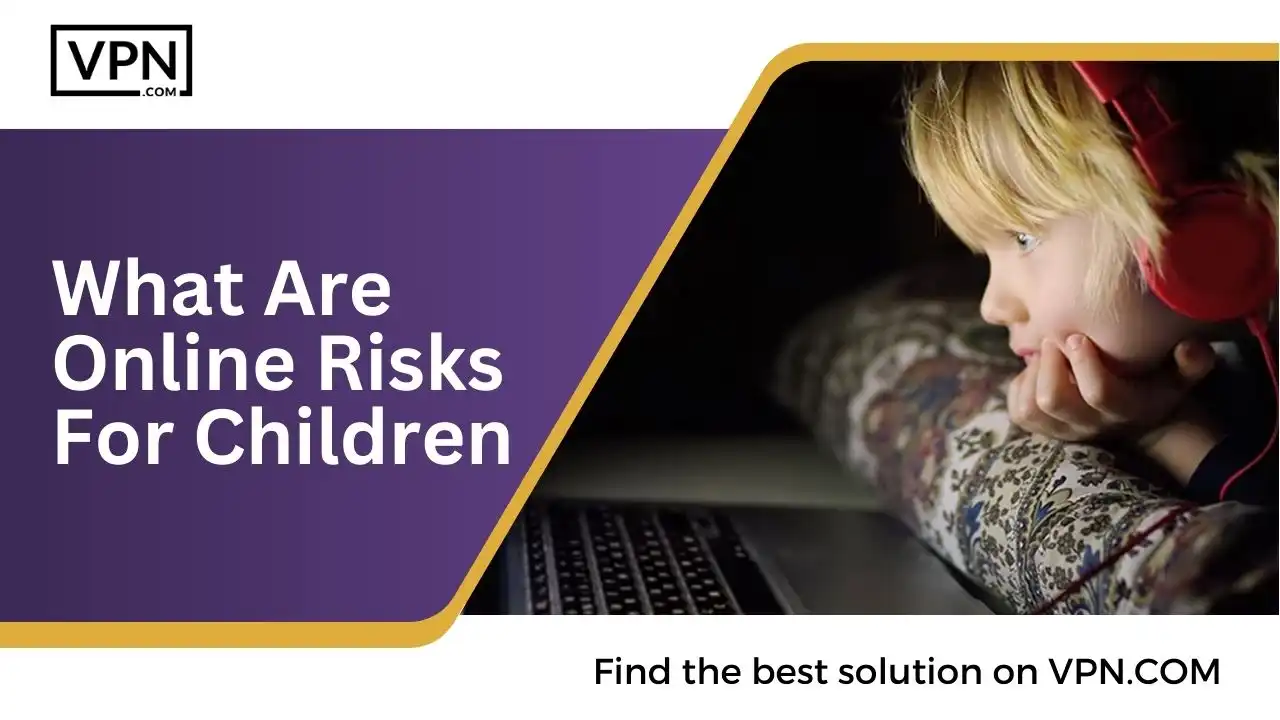What Are Online Risks For Children In 2024

We understand that there are various positive outcomes for kids in this ever-evolving digital world. It includes more opportunities for learning, expression, connection and skills development. We know that nowadays, the digital world offers us many opportunities, especially for our children. But it would be best to understand that these opportunities come with risks. You kids can fall prey to cyberbullying, online predators or technology dependence. Various cyber criminals can use or misuse your kids’ data or spread fake rumors about them. There are many online risks that your children can fall for.
We know that social media plays a significant role in adults, and it is one of the easiest and most democratic ways of communication, illustrating online risks. However, when it comes to kids, this channel still threatens the social media development of teens and kids.
Did you know that by 2022, there were more than 30 million reports that were made relating to child sexual abuse which was made across social media platforms?
So, if you are also one of those parents constantly worried about their kid’s safety, you are in the right place. This issue needs to be resolved, which is why we are here with the online risks for children in 2023, which will help us take adequate measures to prevent them.
Top Online Risks For Children In 2023
Knowing about the dangers your kids can face nowadays is becoming very important. You should understand the importance of it. We will tell you some of the risks that your children can fall prey to. The knowledge and understanding of it will help you prevent any risks. So, let’s get started.
Cyberbullying
After research, we came to know that 90% of teens agree that the major problem in using the internet is cyberbullying, highlighting online risks. Out of 100, 63% of people think it is a severe problem that must be addressed. Did you know that a 2018 survey of children’s online behavior found that 60% of children who use the internet have been victims of bullying? And this is the main reason that kids ignore the behavior altogether.
But what is cyberbullying? This usually involves harassment, humiliation, or threats through digital media platforms like social media, emails, or text messages. For example, someone might share embarrassing photos, spread false rumors or make derogatory comments.
Most of the time, children who fall prey to cyber threats suffer from various emotional and psychological issues. A kid who is victimized by cyberbullying may suffer anxiety, depression and even suicidal thoughts.
So, as a parent, you must see the signs that your child might be experiencing cyberbullying. You can see the sudden changes in their mood and behaviors, their reluctance to engage with technology or their unexplained poor academic performance.
The main question is how can we prevent this issue? The main measures that can be taken to avoid and address this issue are open communication and creating a safe and trustworthy environment where your kid can easily discuss their experience, addressing online risks. Also another effective measure that you can take is educating them on online behavior, privacy settings, and reporting mechanisms. Because this way, they can protect themselves.
Cyber Predators

Do you know that there are online predators that usually stalk children on the internet, representing one of the concerning online risks? These cyber predators will take advantage of kids’ innocence, and if there is no adult supervision, then they will abuse their trust. They can lure your children into hazardous personal encounters IRL. Where are these cyber predators usually found? They lurk on social media platforms usually. They are also found in gaming platforms that are appealing to kids. Cyber predators will use virtual venues where anonymity will facilitate cyberbullying.
At platforms like this, cyber predators will not only play with the kids’ innocence, but they will also exploit their gift of imagination. We all know that “Let’s play pretend” is a very common and healthy part of gaming and interactions, but little do we know that these harmful cyber predators use it as a hook to pull kids in.
To avoid all this, the FBI offers a guide to protect your children against cyber predators and other online hazards, emphasizing the importance of addressing online risks. However, we will again say the best measure we can use is open communication with the kids. Try to provide your children with an environment where they can talk to you about anything.
Posting Private Information
Kids nowadays don’t know what their social media boundaries are. They usually post their personally identifiable information online on their social media profiles; they shouldn’t be out there in public. Your kids don’t know what they should and shouldn’t post; they might post anything. For example, they might post images of awkward moments, home addresses or vacation plans.
Most things your kids post might be in public view, as they have no idea about the public and private views. It means that everyone can see it. This is why you can softly remind them that if your Mother and Father can see it, everyone else can. Never go for the snooping technique. It would be best if you always talked frankly to them so they share everything with you and you can protect them from danger.
Phishing
Phishing is a prevalent online risk that people face nowadays. But do you know what phishing is? It is the use of emails that cybercriminals use to trick people into clicking on links or attachments that contain malware, emphasizing online risks. So, how do you expect kids to detect the malware? The email usually comes from a legitimate source, such as a family member texting you to say, “Hey, we thought you might like this.” Cybercriminals can also do this by using messaging apps or through text messages; we call it smishing.
Phishing emails and smishing texts can appear anytime. Still, the cybercriminals who create them monitor kid-friendly websites and collect personal data, like email addresses and friends’ names, to customize their phishing attacks, highlighting online risks. This is similar to how they spear phish adults to gain access to corporate networks. Instruct your kids not to reply to emails or texts from unknown senders and to be suspicious of messages that look “off” or don’t contain a valid personal message.
Falling For Scams

Children may fall for frauds that provide valuable items, like free access to online games or exclusive features, increasing online risks. Still, they will unlikely fall for Nigerian princes giving them a million dollars. Because they have not yet learned to be cautious, young individuals are excellent targets for scammers. Like phishing, cybercriminals can find possible victims by visiting kid-friendly websites, after which they can offer prizes in exchange for information they need—like parents’ credit card numbers.
The best defense against con artists, regardless of age, is understanding that if an offer seems too good to be true, it generally isn’t. Instruct your kids to be wary of internet deals that make excessive claims, reducing online risks.
Conclusion
Now you know what online risks your kids can fall into. By knowing these online risks, you can protect your kids from becoming victims of cybercriminals. We suggest that the best way to protect your kids is to provide them with an environment where they would feel safe to share anything with you, addressing online risks. Open communication is the key to protecting your kids from any danger coming their way.
Cyberbullying has been very common nowadays, highlighting online risks. It is becoming essential to educate your kids about it. You should give them enough space so that they know they can tell you anything. Parenting is not easy, we know, but if it is done correctly, it can save you from many dangers. We hope we have helped you enough. But if you still have any questions, feel free to ask us.
Customer Reviews for NordVPN: In-Depth Review, Tests, and Stats
![What Are Online Risks For Children In [year]](https://cdn.vpn.com/wp-content/themes/VPN/images/trustpilot/trustpilot_5_star.png)
Connection issues with MLB.TV
May, 2 2023
![What Are Online Risks For Children In [year]](https://cdn.vpn.com/wp-content/themes/VPN/images/trustpilot/trustpilot_5_star.png)
Prompt customer service
May, 6 2023
![What Are Online Risks For Children In [year]](https://cdn.vpn.com/wp-content/themes/VPN/images/trustpilot/trustpilot_5_star.png)
I would highly recommend
December, 15 2023


![What Are Online Risks For Children In [year]](https://cdn.vpn.com/wp-content/themes/VPN/images/icons/payment-methods/mastercard.png)
![What Are Online Risks For Children In [year]](https://cdn.vpn.com/wp-content/themes/VPN/images/icons/payment-methods/american_express.png)
![What Are Online Risks For Children In [year]](https://cdn.vpn.com/wp-content/themes/VPN/images/icons/payment-methods/discover.png)